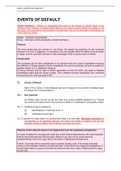Summary
Summary MARKED UP EVENTS OF DEFAULT - BPP Debt Finance
- Module
- Debt Finance
Notes on Debt Finance for the (Accelerated) LPC at BPP University. These consolidated notes have been optimised for exams in line with SGS learning outcomes. These notes are as concise as they can possibly be to make studying for exams quicker while summarising all SGS course content so you don't...
[Show more]



